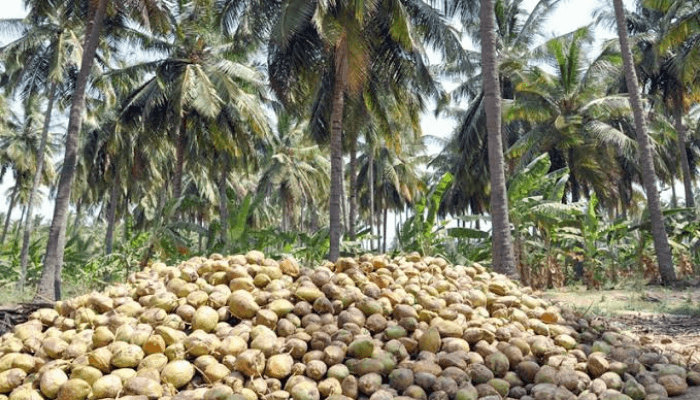
Akwa Ibom State Commissioner for Agriculture Dr Offiong Offor has expressed confidence that it would meet the December 2022 target to plant at least two million coconut trees in the state to provide raw materials for the st Gabriel coconut oil refinery in Mkpat Enin council area.
Speaking with newsmen in Uyo on Monday, Dr Offor said the assurance will allay fears that the multi-billion Naira St Gabriel Coconut Oil Refinery in Mkpat Enin Local Council may be under utilized due to inadequate coconut fruits to meet up its two million coconut per day refining capacity.
He said more than one million hybrid seedlings have already been planted in the last six years at various locations in the state in a renewed effort to meet the demands of the Refinery.
According to the commissioner, new plantations have been established in Okobo, Ini and Eket to complement the main plantation sandwiched between Eastern Obolo/Mkpat Enin/Ikot Abasi while an initiative aimed at encouraging the growing of the plant in public secondary schools has been expanded to public primary schools, local government councils and traditional rulers council.
“Already we have done more than half of the two million and so the fraction that is remaining is not so much and we have plantations in different parts of the state. We have in Mkpat Enin/Eastern Obollo and Ikot Abasi. We also have in Eket, Okobo and the recently commissioned one in Ini Local Council. So we are going to meet with that target by the end of the year, we don’t have any fears about the target.
“I have heard people say the plantations are not doing well, but they are. Some of them have been adjudged to be the best in Nigeria, better than the one in Lagos. Even the Nigerian Quarantine Service adjudged the plantations in Akwa Ibom to be the best, with the best variety of coconut, you can find anywhere in the world.
“But we have to thank the Governor for his vision of raising the raw materials base for the refinery because when the plantations start fruiting we won’t have issues feeding that factory. So just like a baby when she is birthed, she must sit, crawl before she can stand on her feet, so people should not have fears that we will not have raw materials to feed that factory.
“You should also know that before that factory was established, feasibility was carried out and things were put in place to ensure that we meet up with the demand for that factory. So we should applaud Governor Udom Emmanuel’s vision for agriculture in the state because he has laid down things that Akwa Ibomites will use to leverage in the future.” She explained.
Read Also: Obaseki recommits to manpower devt to improve quality delivery in public, civil service
The coconut oil refinery according to her has already commenced refining at a limited scale using fruits from the main plantation and private growers who had earlier embraced the coconut initiative when it was launched some years ago.
The refinery, Offor said was meant to attain full production capacity in phases because the plantations were undertaken in phases and expected not to fruit at the same time while the state would realize the full benefits of the investment in later years as coconut remained one of the most economically viable cash crops.
“The trees are already fruiting. These trees were planted in batches and if any of them have issues you replace them. So some have started fruiting and others will fruit when they get to maturity, so they will not all fruit at the same time.
“And then the factory is producing coconut oil but not on a large scale currently because it takes a while to set up a factory of that magnitude because you have to do all your Ys and cross your Ts, like getting certification from all the different agencies. So it is a process. Commissioning means that we have completed the building, so production is currently done on a small scale.” The commissioner explained.
To encourage private production, she stated that hybrid seedlings have been distributed to farmers while some of the farmers have been captured in various state agricultural empowerment schemes to enable them produce more.
On strategies to mitigate flooding which has damaged many farmlands across the country, Offor expressed appreciation to God that the state was not much affected but said that an early warning mechanism has been developed by her ministry to alert and share information with farmers and fishermen to prepare them ahead of any flood emergency.
She explained that the ministry has collaborated with the National Emergency Management Agency and the State Emergency Management Agency to provide relief materials to farmers and fishermen affected by floods in recent times across the state.
Follow The Trumpet on all our social media platforms for more updates:




